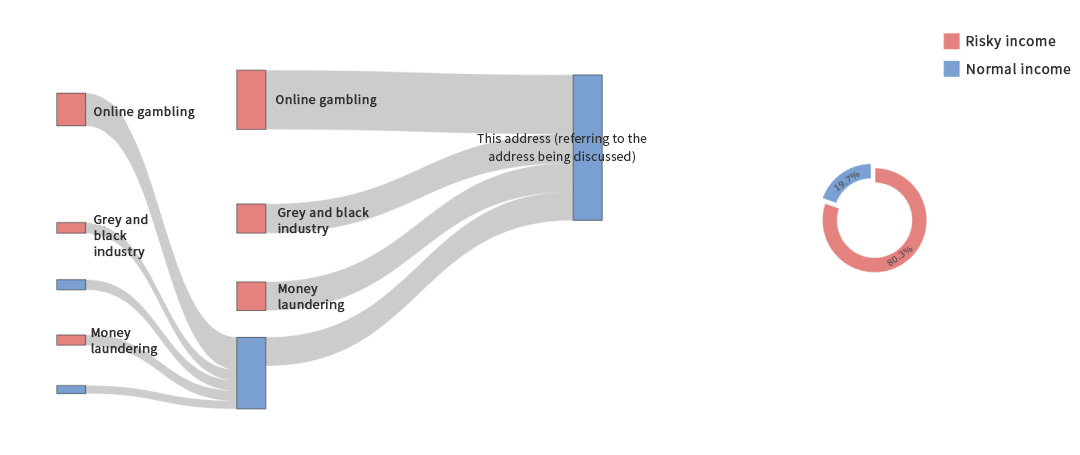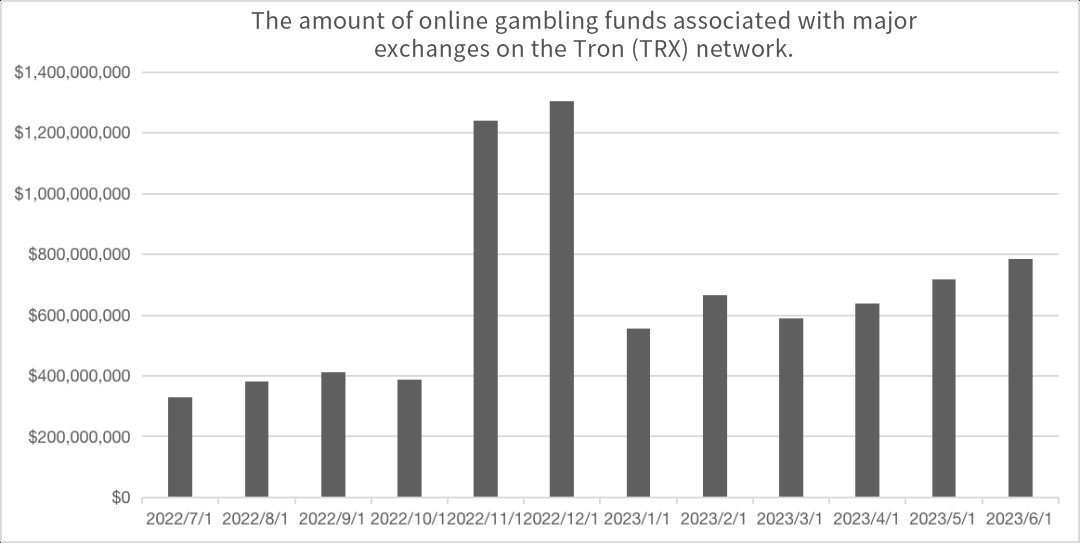Online Gambling Channels Accelerate the Circulation of Illicit Funds,Cryptocurrency Exchanges Must Prioritize Fund Risk Management
By Bitrace
Source: https://mp.weixin.qq.com/s/pciYFbwDIMQXjUj4B4mDyw
Stablecoins play a pivotal role in our industry, providing a more anonymous and flexible value transfer and storage solution compared to traditional fiat currencies with restricted circulation. This feature has attracted significant interest from the gambling industry, as evident from a series of reports by Bitrace, highlighting the extensive adoption of Tether (USDT) - the leading stablecoin - in online gambling activities. Given that online gambling is deemed illegal in certain countries or regions, local residents or platforms accepting USDT related to gambling may face legal risks.
Moreover, Bitrace has observed the use of online gambling channels by certain criminal syndicates to launder stolen or fraudulent cryptocurrencies, thereby exposing cryptocurrency exchanges to additional legal risks when these illicit funds enter regular investors' addresses and trading platforms.
To shed light on the risks associated with online gambling-related crypto funds, this article will expose real-world activities involving the flow of funds to and from online gambling platforms, as well as the increasing trend of contamination in major crypto exchange deposit addresses.
Laundering of Illicit Funds Through Online Gambling Channels
Typically, channels for crypto funds to enter and exit online gambling platforms are established through cryptocurrency payment services. These services provide payment channels to facilitate fund settlements for online gambling platforms. However, due to the lack of basic KYT/AML mechanisms, these platforms indiscriminately accept users' crypto funds, resulting in the inflow of illicit funds.
As an example, Bitrace traced the fund sources of one cryptocurrency payment platform up to five layers of addresses. The data revealed that a portion of the funds received by this address, amounting to 666,000 USDT between September 30, 2022, and July 19, 2023, directly or indirectly originated from addresses associated with internet fraud and phishing websites.
Out of this amount, approximately 41,400 USDT came from addresses related to stolen funds, 36,400 USDT from addresses linked to fraudulent activities, and 15,000 USDT from other high-risk fund-related addresses. This suggests a tendency for certain criminal organizations to launder grey and black cryptocurrencies through online gambling platforms. For the cryptocurrency addresses of gambling platforms, when the funds reach a sufficiently large amount and the deposit-withdrawal frequency is high, these addresses effectively become mixing points for such illicit funds, concealing their ultimate destinations.
Further data indicates that this trend is widespread. Over the past year, the inflow of illegal funds to various online gambling platforms through cryptocurrency payment services far exceeds their legitimate income.
As of July 19, 2023, among 20 sampled payment addresses used for fund settlement on typical online gambling platforms, they were involved in 112,290 transactions with 18,174 counterpart addresses. Apart from other online gambling-related crypto funds, they received 419,968,608 USDT of money laundering-related crypto funds and 428,112,117 USDT of funds related to illicit activities, accounting for 44.42% of their total income. This indicates that online gambling platforms have become part of the money laundering path for criminals.
Contamination of Exchange Addresses by Online Gambling Funds
Another case occurred in the fourth quarter of 2022 when a woman in Santa Clara County, California, fell victim to an emotional fraud scheme, resulting in a loss of approximately $980,000 worth of cryptocurrencies. Investigating officers from the Regional Enforcement Allied Computer Team traced some of the stolen funds to flow into an online gambling pool, with 80,000 USDT being withdrawn and circulated into a certain exchange by Chinese gamblers. The court ruled that the funds acquired by the account owner were illegal proceeds. After freezing the account owner's exchange account for three months, the remaining 30,728 USDT was returned to the victim.
Further investigations into the online gambling platform's fund addresses revealed that during that quarter, some of the platform's addresses directly or indirectly transferred 10,815,500 USDT to more than six centralized exchange addresses. This batch of funds might have entered the exchange's OTC market due to the platform's profit realization or flowed into other investors' accounts via regular gamblers' withdrawals.
Additional data also indicates an increasing trend of gamblers or online gambling platforms and their proxies cashing out gambling funds through centralized cryptocurrency exchanges.
Over the past year, direct or indirectly associated online gambling funds transferred to the hot wallets of mainstream exchanges exceeded 7.6 billion USDT. Among these, smaller and medium-sized exchanges had a higher proportion of risky funds compared to major exchanges, possibly due to differences in risk management capabilities between platforms. Additionally, the surge in online gambling-related funds in November and December 2022 might be related to a significant increase in online gambling activities during the World Cup.
Cryptocurrency Exchanges Should Prioritize Fund Risk Management
The above content aims to illustrate the widespread preference of crypto criminal organizations for laundering grey and black cryptocurrencies through online gambling platforms. With the rise of online gambling activities, the inflow of gambling funds into centralized cryptocurrency exchanges through gamblers' withdrawals and the cashing out by online gambling platforms and their proxies is increasing. This clearly demonstrates that the inflow of grey and black crypto assets through online gambling platforms into exchanges is an undeniable fact, and exchange operators should be vigilant about such compliance risks.
Proposed solutions include:
Implementing more rigorous user address activity reviews on top of basic KYC mechanisms. By analyzing the source of users’ funds and their association with risky addresses, platforms can effectively identify users’ risk levels. If users are found to be receiving illegal funds, the platform should demand explanations of the fund sources. If users attempt to transfer funds to known illegal addresses, the platform should issue risk warnings or emergency freezes to minimize the contamination of business addresses by illegal funds.
Actively understanding local laws and regulations and collaborating with law enforcement agencies. Platforms need to establish or commission professional teams to comply with and review global law enforcement requests, assisting in identifying, combating, and preventing cryptocurrency-related criminal activities to minimize economic losses.
Collaborating with security and data companies to establish a threat intelligence database. By accessing third-party external risk address data, such as Bitrace, platforms can quickly identify the source of users’ crypto funds, preventing the harm of illegal funds to platform business addresses and other user addresses.
Follow us
Twitter: https://twitter.com/WuBlockchain
Telegram: https://t.me/wublockchainenglish






